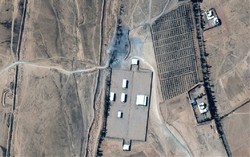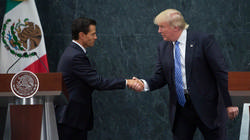President Joe Biden ordered a military airstrike near Abu Kamal, Syria on Feb 26. This was his first military action as Commander-In-Chief since taking office on Jan 20, and the intention was to be a retaliation for Iranian-backed militia groups that have recently attacked U.S. military encampments.
Saliba Sarsar, Ph.D., Professor of Political Science, said he sees the attack as being part of a larger state of affairs.
“The attack was not random; there is a current struggle going on in the Arabian or Persian Gulf for regional hegemony, mostly between Iran and Saudi Arabia. The United States is, of course, allied with Saudi Arabia and other countries like Israel, Jordan, and Egypt against Iran,” said Sarsar.
Biden called off an additional airstrike on March 4. He was notified by Pentagon officials that children and civilians were in one of the targeted areas. Sarsar continued, “I believe the Biden administration was very calculated. They tried their best to send a message to Iran to behave, and not too intrusive or aggressive.”
According to BBC, the government of Syria criticized the American airstrike, arguing it was “unlawful” by international treaties. The airstrike was not politically unprecedented. Both former U.S. presidents Trump and Obama have authorized military actions in Syria.
The military attack comes at a time where the United States has recently gone through a new presidential transition. Ken E. Mitchell, Ph.D., Chair of the Department of Political Science & Sociology, described the current state of the United States’ foreign relations.
He said, “President Biden is a committed internationalist and values traditional alliances—NATO, USMCA, WTO, OAS, and so forth. However, he inherited a world unfamiliar to him.”
Mitchell said that Biden doesn’t understand that Trump was loathed by our traditional allies and they understand Trump could return in 2024.
He said, “Trump during his time in the White House read the USA electorate well: it had zero interest in foreign affairs, and it desired to drift back toward the America’s pre-WWII isolationist past. This strategy worked reasonably well in terms of domestic politics—he almost won in 2020—but he ruined our position in the world and now everything is harder at the global level.”
Mitchell also emphasized the importance of America’s strategic alliances in the Middle East.
He said, “Biden’s air strike is small business. Iranian backed groups are all over Iraq and flare-ups occur frequently. Biden is backing away from the Saudis—ending the U.S. commitment to Saudi war in Yemen—and how this plays out in the various proxy wars between the Iranians and Saudis is unclear.”
Mitchell said Biden understands that the American public has no desire for further commitments in the Middle East, so he does not anticipate much beyond the occasional exchange of rockets.
Over recent years, there has been a debate about how the U.S. should have a role in the Middle East. Matt Filosa, a junior political science student, said, “When it comes to Middle Eastern affairs, the U.S. has been entrenched in endless conflict that has resulted in much death in terms of our military personnel and cost.”
The airstrike was reported to have one fatality officially, but experts said that the number could be up to 22.
“Looking at U.S. strategy in the Middle East today, moving U.S. troops out of the region may be better but there are threats that do exist. The Middle East is not a one solution problem, the different countries have different issues,” said Filosa.
He said that Afghanistan is America’s longest war and he feels that it has gone on for too long. Filosa also said that if the U.S. fully withdraws, it gives power back to the Taliban which could erase the work of 20 years of war.
“In that case, removing conventional forces could be a smart move while relying on U.S. Special Operations Forces for short term deployment and training of national forces in the country,” said Filosa.
He added, “Our relations with Saudi Arabia are, in my opinion, against our values as a country. They murdered a journalist who is a dual Saudi-American citizen, and the current Administration did not go after them hard enough. But that is because we trade oil in exchange for weapons because they are against Iran in a proxy war in Yemen, which is also a major human rights crisis.”
He concluded by saying more open dialogue and diplomacy should be conducted with Iran to bring them to the table.
While the Middle East is in constant flux, Sarsar argued for diplomacy and moderation in resolving current problems. He said, “It is about time for the U.S. to balance its pragmatism with its principles and assist Middle Easterners to envision and actualize a future full of potential, hope, stability, and peace for all!”
IMAGE TAKEN from NBC News




